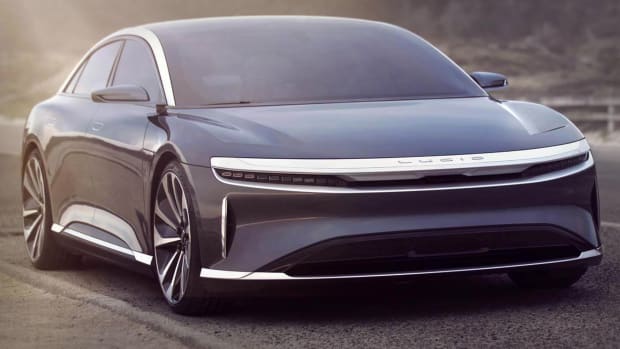
Since January, Lucid Motors has not managed to deliver some good news.
The young EV manufacturer (LCID), held 61% at Dec. 30 by Public Investment Fund, the sovereign-wealth fund of Saudi Arabia, just reported a sharply wider first-quarter loss. And it seems caught in a downtrend.
The loss widened to $779.5 million, or 43 cents a share, the company reported on May 8, from $81.3 million, or 5 cents a share, in the year-earlier period.
First-quarter revenue more than doubled to $149.4 million from $57.7 million a year earlier. The problem: Analysts were expecting revenue of around $209.9 million.
Lucid, seen as a rival to Tesla (TSLA) in the luxury-electric-car market, has been trying to increase its production rates.
Lucid: Gap Between Deliveries and Production
The revenue miss suggests that the carmaker did not sell as many vehicles as expected. Last month the carmaker said it delivered 1,406 Air sedans to customers in the first quarter and produced 2,314 units.
The gap between deliveries and units produced cast a chill as it suggested that demand for the Lucid Air sedan is weak. The group had said that the month of January had been "slow.”
It also said that the new criteria set by the administration of President Joe Biden by which clean-vehicle buyers could take advantage of the $7,500 federal tax credit had had sharply hurt its sales. The Lucid Air and its variants no longer benefit from this tax credit due to their hefty prices. The 2023 Lucid Air starts at $87,400.
Lucid apparently continues to face demand issues as it has scaled back its production target for 2023. It plans to manufacture “over 10,000” Air sedans this year compared with the 10,000 to 14,000 estimate it announced in February.
"We are on track to produce over 10,000 vehicles in 2023, with companywide initiatives ongoing that will enable Lucid to pivot to higher volumes as market conditions allow," said Peter Rawlinson, Lucid's chief executive and chief technology officer. "We continue to grow our brand awareness."

Lucid Motors
Yet the Newark, Calif., company had said that as of Feb. 21 it had "over 28,000" reservations for the Lucid Air. How to justify the discrepancy between the low production target and the reservations if not by the idea that Lucid is struggling to convince customers with reservations to proceed with their purchases?
Lucid on May 8 declined to publicly update its order book. The company's plant in Arizona -- its only factory as of now -- has production capacity of 34,000 vehicles a year.
Lucid Has Enough Cash Through June 2024
The carmaker, which has been burning a lot of cash, tried to reassure investors by saying it has $3.4 billion in cash and about $700 million in available credit.
"We ended the quarter with just over $3.4 billion in cash, cash equivalents, and investments, with total liquidity of approximately $4.1 billion, which we believe is sufficient to fund the company at least into Q2 of 2024," said Sherry House, Lucid's chief financial officer.
"Our mission and optimism are unchanged. We are committed to an environmentally sustainable future – designing, building, and delivering the best EVs on the market."
At the end of 2022, Lucid had a total of $4.4 billion in cash and an additional $500 million in credit available as of December 2022.
In recent weeks, the company launched a major restructuring, including eliminating 1,300, or 18%, of its jobs last month.

Lucid Motors
One of Lucid's big challenges is that Tesla this year launched a price war, slashing prices on all its models several times since January. As a result, the base Model S luxury sedan now starts at $87,490, while the Model S Plaid now costs $107,490.
The Lucid Air comes in three variants -- Pure, Touring and Grand Touring. The base prices are $87,400, for the Lucid Air Pure, $107,400 for the Air Touring, and $138,000 for the Air Grand Touring, according to the company's website.
The group plans to start production of its first SUV, the Gravity, in 2024. This vehicle will go toe to toe with Tesla's Model X.
Action Alerts PLUS offers expert portfolio guidance to help you make informed investing decisions. Sign up now.







